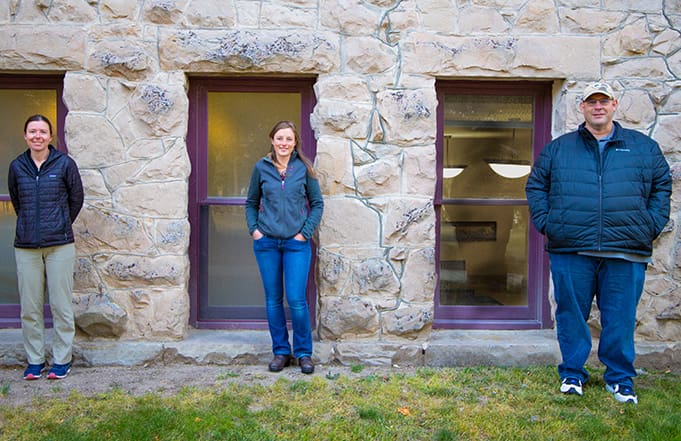October 16, 2020
Earlier this year, four faculty from the Biology and Mathematics Departments attended the 2-week virtual “Cultivating Scientific Curiosity” workshop.

This workshop, sponsored jointly by the national BioQUEST curriculum consortium and QUBES (Quantitative Undergraduate Biology Education and Synthesis) network, focused on developing innovative undergraduate research experiences (UREs) for students in math and science classes. The workshop will continue as a faculty mentoring network through the fall, helping UMW faculty connect with collaborators across the country to plan or implement UREs during the fall semester. The UMW faculty participating are Dr. Michelle Anderson (Biology), Katie Bjornen (Biology), Dr. Eric Dyreson (Mathematics) and Dr. Joseph Eason (Mathematics). The UMW team will be participating in a faculty group focused on implementing multi-course URE’s in order to bring more undergraduate research into their courses.
The BioQUEST Curriculum Consortium is a community of scientists, educators and learners of all ages who are interested in supporting biology education that reflects realistic scientific practices. QUBES is an NSF-funded project built around a virtual center that provides logistical, intellectual, and community support for innovative and exciting ways of teaching quantitative biology education. During the summer portion of the workshop, UMW faculty learned about numerous tools and networks designed to help faculty bring research experiences to their students.
One of the tools presented was the Biodiversity Literacy in Undergraduate Education (BLUE) Data network, which facilitates moving museum specimen data online for easier access to useful data tools for students and professors. The data is open source and available online and is cataloged by date so that you can look for specific times to better understand how the data changes over time.
Because three of the faculty are teaching linked honors courses, they chose to participate in the group that is focused on implementing multi-course CUREs (Course-based Undergraduate Research Experiences). Katie Bjornen is teaching HONR 194X, “You and Your Genome”, which is linked with Eric Dyreson’s HONR 194Y, “Your Genome on Mathematics.” In these linked courses, students will first learn about DNA and the biology involved with studying and understanding its importance. In the second course, students will apply probability to what they have learned in the first course in order to learn the subject of probability.
Joseph Eason is teaching HONR 194AA, “Mathematical Disasters,” which is linked with and follows HONR 194Z, “A Series of Unfortunate Geological Events,” where students will first learn about Geology and natural disasters while collecting data, which they will then analyze, and use to write probabilistic models in Mathematical Disasters.
Michelle Anderson and Eric Dyreson are also working to link quantitative ecology and wildlife UREs across multiple upper-division math and science courses this fall, including BIOE 370 Ecology, WILD 471 Wildlife Ecology & Management, STAT 233 Biostatistics, and STAT 335 Advanced Field Statistics. The URE topics in these classes include plant-pollinator interactions, forest stand dynamics in relation to climate, lichen landscape diversity, mosquito disease surveillance, and wildlife population monitoring.
Several of these projects are in collaboration with students at other campuses across the United States through the Ecological Research as Education Network (EREN), and involve exploration of open-source, big data from the National Ecological Observatory Network (NEON).
All of the professors hope that they can help bring exciting undergraduate research experiences to UMW students by participating in the Cultivating Scientific Curiosity workshop.
For more information about Experience One at Montana Western, where students take one course at a time for 18 days and then move on to their next course, visit www.umwestern.edu or call 877-683-7331.